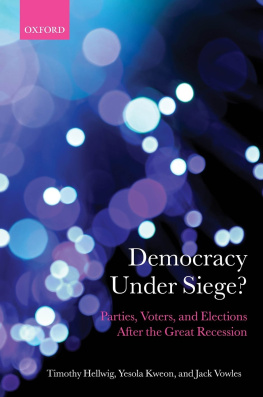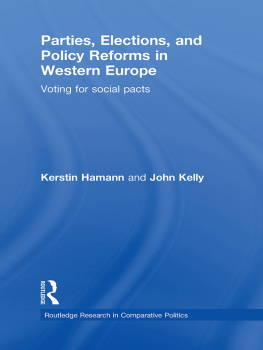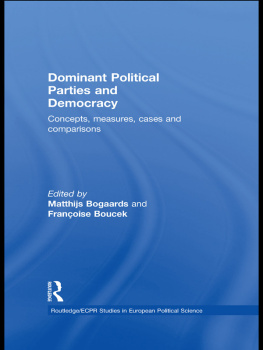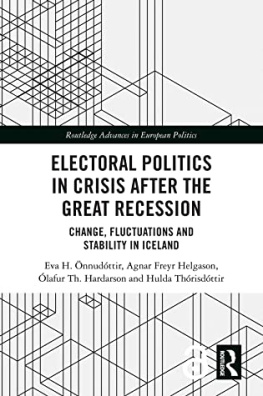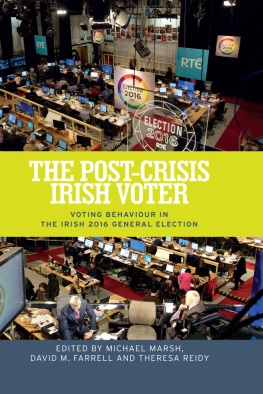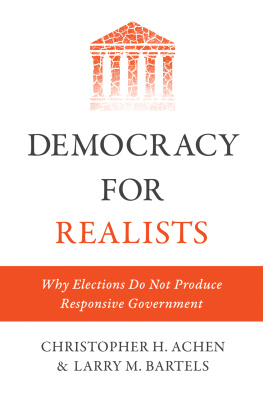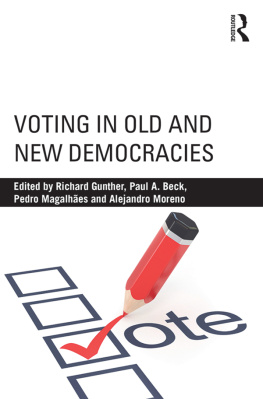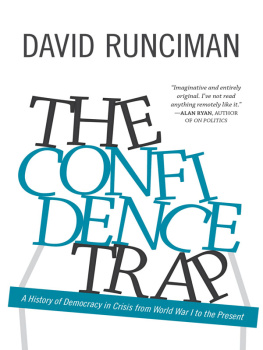Democracy Under Siege?
Volumes of a Collaborative Research Programme Among Election Study Teams from Around the World
Series editors: Hans-Dieter Klingemann and Ian McAllister
The Comparative Study of Electoral Systems (CSES) is a collaborative programme of research among election study teams from around the world. Participating countries include a common module of survey questions in their post-election studies. The resulting data are deposited along with voting, demographic, district, and macro variables. The studies are then merged into a single, free, public dataset for use in comparative study and cross-level analysis.
The set of volumes in this series is based on these CSES modules, and the volumes address the key theoretical issues and empirical debates in the study of elections and representative democracy. Some of the volumes will be organized around the theoretical issues raised by a particular module, while others will be thematic in their focus. Taken together, these volumes will provide a rigorous and ongoing contribution to understanding the expansion and consolidation of democracy in the twenty-first century.

Further information on CSES activities can be obtained from:
CSES Secretariat
Center for Political Studies
Institute for Social Research
The University of Michigan
426 Thompson Street
Ann Arbor, Michigan 481042321
USA
CSES web site: http://www.cses.org

Great Clarendon Street, Oxford, OX2 6DP, United Kingdom
Oxford University Press is a department of the University of Oxford. It furthers the Universitys objective of excellence in research, scholarship, and education by publishing worldwide. Oxford is a registered trade mark of Oxford University Press in the UK and in certain other countries
Timothy Hellwig, Yesola Kweon, and Jack Vowles 2020
The moral rights of the authors have been asserted
First Edition published in 2020
Impression: 1
All rights reserved. No part of this publication may be reproduced, stored in a retrieval system, or transmitted, in any form or by any means, without the prior permission in writing of Oxford University Press, or as expressly permitted by law, by licence or under terms agreed with the appropriate reprographics rights organization. Enquiries concerning reproduction outside the scope of the above should be sent to the Rights Department, Oxford University Press, at the address above
You must not circulate this work in any other form and you must impose this same condition on any acquirer
Published in the United States of America by Oxford University Press
198 Madison Avenue, New York, NY 10016, United States of America
British Library Cataloguing in Publication Data
Data available
Library of Congress Control Number: 2020937729
ISBN 9780198846208
ebook ISBN 9780192585134
Printed and bound in Great Britain by
Clays Ltd, Elcograf S.p.A.
Links to third party websites are provided by Oxford in good faith and for information only. Oxford disclaims any responsibility for the materials contained in any third party website referenced in this work.
Series Editors Preface
Democracyits past, present and, most importantly, its futureis one of the foremost preoccupations of the twenty-first century. The rise of populism and the far right in Europe, the election of Donald Trump in the United States, and the Brexit debate in the United Kingdom, have all provided a greater incentive for scholars and practitioners to understand the dynamics of public opinion towards democracy and the processes that underpin it. This concern has never been more relevant, as the young participate less in elections, party attachments weaken in electorates, and political debate becomes more polarized.
It is this vital component of democracyits public supportthat the Comparative Study of Electoral Systems (CSES) project is designed to investigate. Beginning in 1994, the CSES has conducted large-scale surveys across a wide range of countries in order to understand mass political behaviour under varying institutional arrangements. This enables us to address some of the key questions about the process of democratization across the world. The unique capacity of the CSES to trace the interaction between mass political behaviour and institutional structures sets it apart from all of the other cross-national projects in political science.
This CSES Oxford book series presents the key findings from this major research project. The inaugural volume, edited by Hans-Dieter Klingemann, documented much of the projects historical background, the basic principles of data collection, and provided sample chapters showing many of the analytical possibilities of this unique data collection. This volume is based on the first module of survey questions in the CSES, completed in 2001, which examines the interaction of political institutions and political behaviour regarding attitudes towards the democratic regime, the political authorities, and the quality of the political process generally.
As with the first volume, the second one, edited by Russell J. Dalton and Christopher J. Anderson, addresses the fundamental question of whether the institutional structure of elections affects the nature of the publics choices. The first question looks at explanations for turnout, and how institutions structure the likelihood of voting. The second question discusses determinants of individual electoral behaviour and examines the role of institutions in shaping what kinds of political attitudes voters acquire.
The third volume in the series, by Russell J. Dalton, David Farrell, and Ian McAllister, describes and explains the role of political parties in election campaigns, in forming the electoral choice of voters and their role in government and opposition. The theoretical arguments relate to the logic of the responsible parties model. It is the first study to test these ideas using a comprehensive and comparative design. It demonstrates the importance of the leftright schema to enable political positioning, political communication, and political representation.
Representation and accountability are the focus of the fourth volume, edited by Jacques Thomassen. Inspired by Arend Lijpharts theory, the analyses contrast voting and elections in countries of majoritarian Westminster and consensus democracies. The volume asks the question: do consensus models of democracy serve the interests of their citizens better than majoritarian systems? The answer is that formal institutions such as the electoral system matter less than might be expected. What do matter are the characteristics of the party system, such as the level of polarization and the clarity of accountability.
The fifth volume, edited by Jack Vowles and Georgios Xezonakis, asks how globalization affects democratic mass politics, and in particular the political attitudes and behaviour of ordinary citizens and the policies of political partiesnot just governments. This represents an important corrective for the extant research, which has so far dealt mostly with the public policy implications of globalization. The contributors to the volume show that the relentless march of globalization over the past two decades has created winners and losers, with the political impact of the latter group being dependent on the extent to which they are able to translate economic insecurity into political action.

